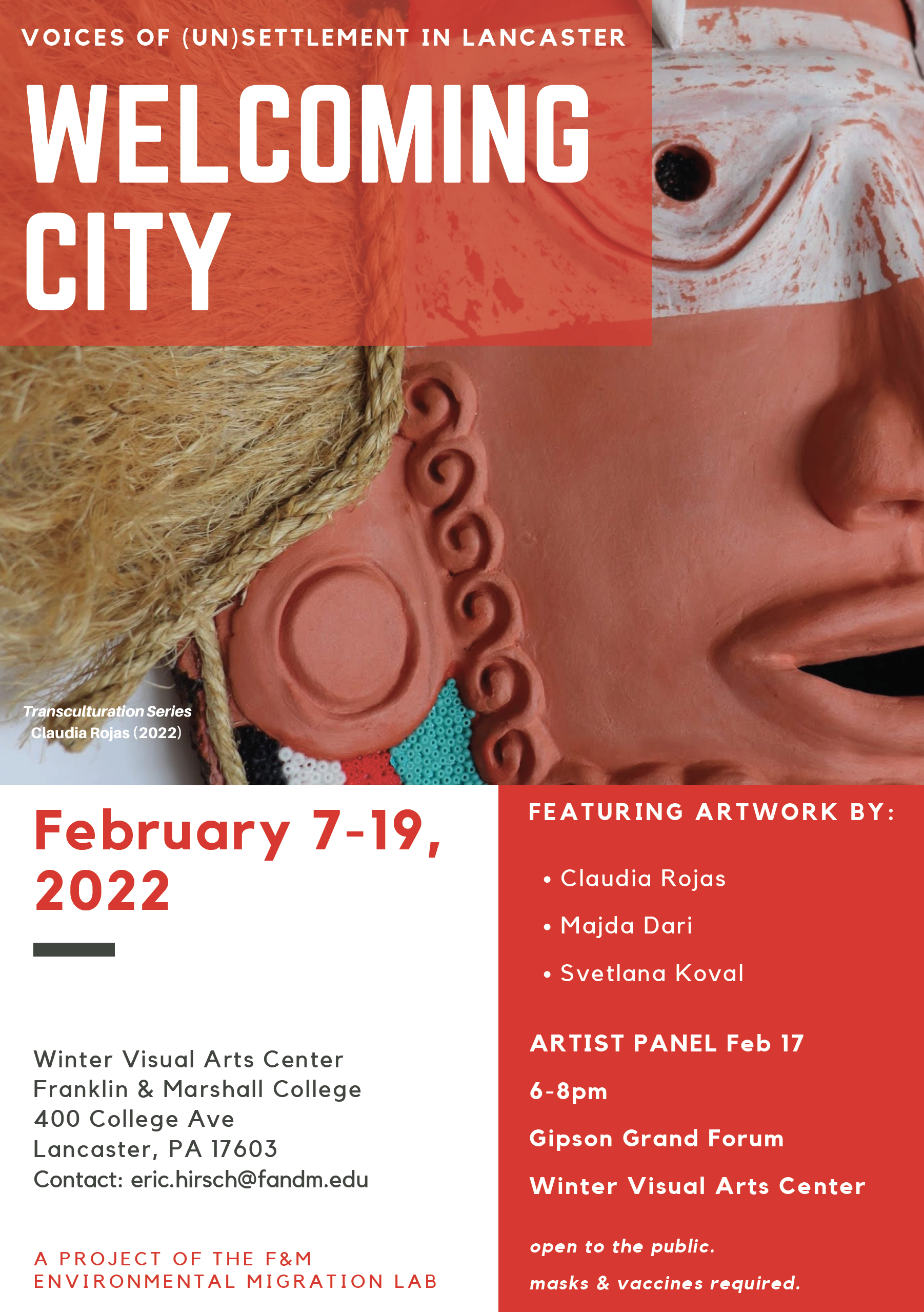About the exhibition:
WELCOMING CITY: VOICES OF (UN)SETTLEMENT IN LANCASTER mobilizes community artists, migration narratives, refugee life histories, images, poetry, media objects, and prosaic household items to showcase the hopes, the frustrations, and the anxieties of displacement in a community proud of its open arms but also full of contradictions. The juxtapositions filling this gallery reflect the promises and paradoxes of creating and dwelling in a “welcome” environment in a contemporary American town.
Welcoming City is a project of the F&M Environmental Migration Lab. It received support from the college's Center for Sustained Engagement with Lancaster and has been co-curated by Eric Hirsch (F&M) and Amer Al Fayadh (Communication Essentials LLC).
About the artists:
Claudia Rojas, who is contributing three new pieces commissioned for the Welcoming City exhibition, is a Cuban American mixed media artist. Born in Cuba, she completed a BA in Social Communication from the University of Havana; afterwards, she earned a fellowship for her Afro-Cuban art research in the University of Morelos in Mexico, and eventually migrated to the United States in 2015. She is currently working on her MA project for the Barcelona School of Design. Locally, she has participated in Lancaster’s Art Walk and First Friday events, was commissioned by CWS to collaborate in the public art project “Keys for the City”, as well as having developed and taught an art program for unaccompanied migrant children ages 3-17. Her interests and experiences include photography, design, and fine arts, with several pieces in diverse mediums. The most recent project she is working on, “The colors of my community”, is a community-based project that will serve as a space for inclusion and representation that will produce a collection of illustrated children’s books available in different languages. Her subject matters gravitate towards migration, transculturation, community, and identity, approaching them from a myriad of different angles, with her portfolio being as restless as her travel history.
Majda Dari is a renowned Kurdish Syrian writer and poet, and the author of Nahr Al Kharaz [River of Beads], a collection of poems. Influenced by her brother, literary critic and poet Jameel Dari, her passion for writing started from a young age. She studied at Damascus University, Faculty of Arts, Department of Philosophy and Psychology. She has written poetry since her middle school years. She writes in Arabic because of her love for this language.
Svetlana Koval is a visual artist from the Siberia region of Russia. Painting has been an integral part of her life. While she lived in Russia, she worked as a teacher at an art school and had her paintings exhibited at a local gallery. In 2015, she and her family moved to live in the USA. Here she participated in local exhibitions and art festivals such as the Long's Park Festival. Her artwork has received a variety of awards, including the American Art Award and the GoggleWorks Center for the Arts Grand Prize. She now lives with her family in Ephrata and collaborates with galleries in New Hope.
About the curators:
Amer Alfayadh is the Founder and CEO of Communication Essentials LLC, where he leads the consultations and oversees interpretation/translation services. Amer, originally from Iraq, resettled in Pennsylvania in 2010. After resettling, Amer worked for Church World Service, a nonprofit where he engaged with people from over 30 countries. He listened to their stories, learned about their challenges, and witnessed the impact a community can make when we invest in one another. Amer believes that our differences are our strengths when we discover the ways to utilize our unique sets of skills and engage in open conversations throughout the community.
Eric Hirsch is an Assistant Professor of Environmental Studies at Franklin & Marshall College and leads the F&M Environmental Migration Lab, an ongoing faculty-student research collaboration that has involved building an archive of testimonies from Lancaster's community of refugee, immigrant, and displaced residents. Trained as an anthropologist, he also researches climate adaptation, development projects, resource extraction, and the politics of migration and mobility, with a focus on the Peruvian Andes.
This exhibition is made possible by support from the following Franklin & Marshall College initiatives: the Center for Sustained Engagement with Lancaster, the Catalyst Fund Grant, and the Winter Visual Arts Center Cross-Pollinator Residency.
